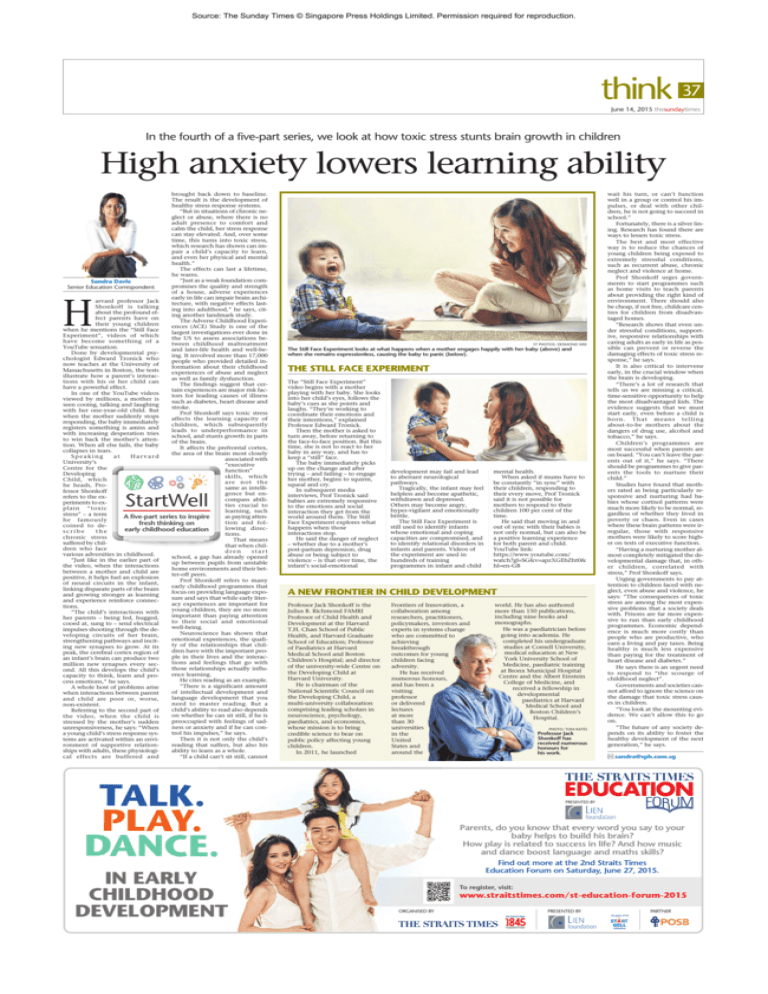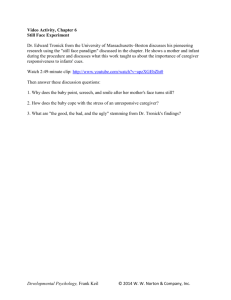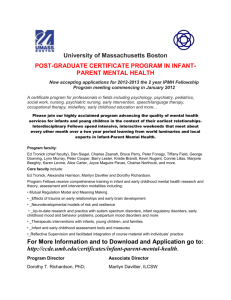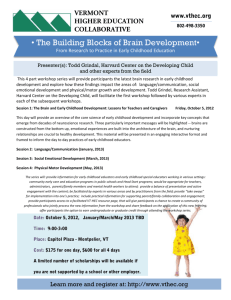14 June 2015 - Lien Foundation
advertisement

Source: The Sunday Times © Singapore Press Holdings Limited. Permission required for reproduction. think 37 June 14, 2015 thesundaytimes In the fourth of a five-part series, we look at how toxic stress stunts brain growth in children High anxiety lowers learning ability brought back down to baseline. The result is the development of healthy stress response systems. “But in situations of chronic neglect or abuse, where there is no adult presence to comfort and calm the child, her stress response can stay elevated. And, over some time, this turns into toxic stress, which research has shown can impair a child’s capacity to learn, and even her physical and mental health.” The effects can last a lifetime, he warns. “Just as a weak foundation comSandra Davie promises the quality and strength Senior Education Correspondent of a house, adverse experiences early in life can impair brain archiarvard professor Jack tecture, with negative effects lastShonkoff is talking ing into adulthood,” he says, citabout the profound efing another landmark study. fect parents have on The Adverse Childhood Experitheir young children ences (ACE) Study is one of the when he mentions the “Still Face largest investigations ever done in Experiment”, videos of which the US to assess associations behave become something of a tween childhood maltreatment YouTube sensation. and later-life health and well-beDone by developmental psying. It involved more than 17,000 chologist Edward Tronick who people who provided detailed innow teaches at the University of formation about their childhood Massachusetts in Boston, the tests experiences of abuse and neglect illustrate how a parent’s interacas well as family dysfunction. tions with his or her child can The findings suggest that cerhave a powerful effect. tain experiences are major risk facIn one of the YouTube videos tors for leading causes of illness viewed by millions, a mother is such as diabetes, heart disease and seen cooing, talking and laughing stroke. with her one-year-old child. But Prof Shonkoff says toxic stress when the mother suddenly stops affects the learning capacity of responding, the baby immediately children, which subsequently registers something is amiss and leads to underperformance in with increasing desperation tries school, and stunts growth in parts to win back the mother’s attenof the brain. tion. When all else fails, the baby It affects the prefrontal cortex, collapses in tears. the area of the brain most closely Speaking at Harvard associated with University’s “executive Centre for the function” Developing skills, which Child, which are not the he heads, Prosame as intellifessor Shonkoff gence but enrefers to the excompass abiliperiments to exties crucial to plain “toxic learning, such stress” – a term as paying attenA five-part series to inspire he famously tion and folfresh thinking on coined to delowing direcearly childhood education scribe the tions. chronic stress That means suffered by chilthat when children who face dren start various adversities in childhood. school, a gap has already opened “Just like in the earlier part of up between pupils from unstable the video, when the interactions home environments and their betbetween a mother and child are ter-off peers. positive, it helps fuel an explosion Prof Shonkoff refers to many of neural circuits in the infant, early childhood programmes that linking disparate parts of the brain focus on providing language expoand growing stronger as learning sure and says that while early literand experience reinforce connecacy experiences are important for tions. young children, they are no more “The child’s interactions with important than paying attention her parents – being fed, hugged, to their social and emotional cooed at, sung to – send electrical well-being. impulses shooting through the deNeuroscience has shown that veloping circuits of her brain, emotional experiences, the qualistrengthening pathways and incitty of the relationships that chiling new synapses to grow. At its dren have with the important peopeak, the cerebral cortex region of ple in their lives and the interacan infant’s brain can produce two tions and feelings that go with million new synapses every secthose relationships actually influond. All this develops the child’s ence learning. capacity to think, learn and proHe cites reading as an example. cess emotions,” he says. “There is a significant amount A whole host of problems arise of intellectual development and when interactions between parent language development that you and child are poor or, worse, need to master reading. But a non-existent. child’s ability to read also depends Referring to the second part of on whether he can sit still, if he is the video, when the child is preoccupied with feelings of sadstressed by the mother’s sudden ness or anxiety and if he can conunresponsiveness, he says: “When trol his impulses,” he says. a young child’s stress response sysThen it is not only the child’s tems are activated within an envireading that suffers, but also his ronment of supportive relationability to learn as a whole. ships with adults, these physiological effects are buffered and “If a child can’t sit still, cannot H StartWell ST PHOTOS: DESMOND WEE The Still Face Experiment looks at what happens when a mother engages happily with her baby (above) and when she remains expressionless, causing the baby to panic (below). THE STILL FACE EXPERIMENT The “Still Face Experiment” video begins with a mother playing with her baby. She looks into her child’s eyes, follows the baby’s cues as she points and laughs. “They’re working to coordinate their emotions and their intentions,” explained Professor Edward Tronick. Then the mother is asked to turn away, before returning to the face-to-face position. But this time, she is not to react to her baby in any way, and has to keep a “still” face. The baby immediately picks up on the change and after trying – and failing – to engage her mother, begins to squirm, squeal and cry. In subsequent media interviews, Prof Tronick said babies are extremely responsive to the emotions and social interaction they get from the world around them. The Still Face Experiment explores what happens when those interactions stop. He said the danger of neglect – whether due to a mother’s post-partum depression, drug abuse or being subject to violence – is that over time, the infant’s social-emotional development may fail and lead to aberrant neurological pathways. Tragically, the infant may feel helpless and become apathetic, withdrawn and depressed. Others may become angry, hyper-vigilant and emotionally brittle. The Still Face Experiment is still used to identify infants whose emotional and coping capacities are compromised, and to identify relational disorders in infants and parents. Videos of the experiment are used in hundreds of training programmes in infant and child A NEW FRONTIER IN CHILD DEVELOPMENT Professor Jack Shonkoff is the Julius B. Richmond FAMRI Professor of Child Health and Development at the Harvard T.H. Chan School of Public Health, and Harvard Graduate School of Education; Professor of Paediatrics at Harvard Medical School and Boston Children's Hospital; and director of the university-wide Centre on the Developing Child at Harvard University. He is chairman of the National Scientific Council on the Developing Child, a multi-university collaboration comprising leading scholars in neuroscience, psychology, paediatrics, and economics, whose mission is to bring credible science to bear on public policy affecting young children. In 2011, he launched Frontiers of Innovation, a collaboration among researchers, practitioners, policymakers, investors and experts in systems change who are committed to achieving breakthrough outcomes for young children facing adversity. He has received numerous honours, and has been a visiting professor or delivered lectures at more than 30 universities in the United States and around the TALK. PLAY. DANCE. IN EARLY CHILDHOOD DEVELOPMENT mental health. When asked if mums have to be constantly “in sync” with their children, responding to their every move, Prof Tronick said it is not possible for mothers to respond to their children 100 per cent of the time. He said that moving in and out of sync with their babies is not only normal, but can also be a positive learning experience for both parent and child. YouTube link: https://www.youtube.com/ watch?gl=SG&v=apzXGEbZht0& hl=en-GB world. He has also authored more than 150 publications, including nine books and monographs. He was a paediatrician before going into academia. He completed his undergraduate studies at Cornell University, medical education at New York University School of Medicine, paediatric training at Bronx Municipal Hospital Centre and the Albert Einstein College of Medicine, and received a fellowship in developmental paediatrics at Harvard Medical School and Boston Children’s Hospital. PHOTO: TOM KATES Professor Jack Shonkoff has received numerous honours for his work. wait his turn, or can’t function well in a group or control his impulses, or deal with other children, he is not going to succeed in school.” Fortunately, there is a silver lining. Research has found there are ways to lessen toxic stress. The best and most effective way is to reduce the chances of young children being exposed to extremely stressful conditions, such as recurrent abuse, chronic neglect and violence at home. Prof Shonkoff urges governments to start programmes such as home visits to teach parents about providing the right kind of environment. There should also be cheap, if not free, childcare centres for children from disadvantaged homes. “Research shows that even under stressful conditions, supportive, responsive relationships with caring adults as early in life as possible can prevent or reverse the damaging effects of toxic stress response,” he says. It is also critical to intervene early, in the crucial window when the brain is developing. “There’s a lot of research that tells us we are missing a critical, time-sensitive opportunity to help the most disadvantaged kids. The evidence suggests that we must start early, even before a child is born. That means telling about-to-be mothers about the dangers of drug use, alcohol and tobacco,” he says. Children’s programmes are most successful when parents are on board. “You can’t leave the parents out of it,” he says. “There should be programmes to give parents the tools to nurture their child.” Studies have found that mothers rated as being particularly responsive and nurturing had babies whose cortisol patterns were much more likely to be normal, regardless of whether they lived in poverty or chaos. Even in cases where these brain patterns were irregular, those with responsive mothers were likely to score higher on tests of executive function. “Having a nurturing mother almost completely mitigated the developmental damage that, in other children, correlated with stress,” Prof Shonkoff says. Urging governments to pay attention to children faced with neglect, even abuse and violence, he says: “The consequences of toxic stress are among the most expensive problems that a society deals with. Prisons are far more expensive to run than early childhood programmes. Economic dependence is much more costly than people who are productive, who earn a living and pay taxes. Being healthy is much less expensive than paying for the treatment of heart disease and diabetes.” He says there is an urgent need to respond to “the scourge of childhood neglect”. Governments and societies cannot afford to ignore the science on the damage that toxic stress causes in children. “You look at the mounting evidence. We can’t allow this to go on. “The future of any society depends on its ability to foster the healthy development of the next generation,” he says. sandra@sph.com.sg PRESENTED BY Parents, do you know that every word you say to your baby helps to build his brain? How play is related to success in life? And how music and dance boost language and maths skills? Find out more at the 2nd Straits Times Education Forum on Saturday, June 27, 2015. To register, visit: www.straitstimes.com/st-education-forum-2015 ORGANISED BY PRESENTED BY PARTNER As part of its initiative







